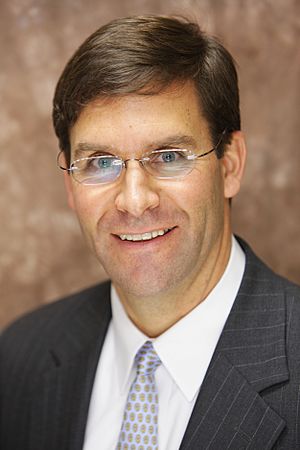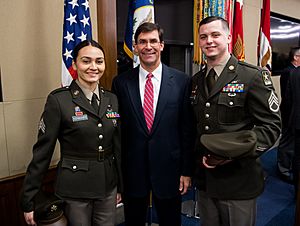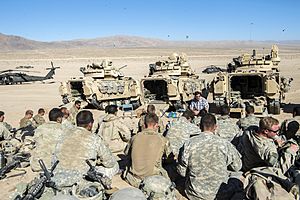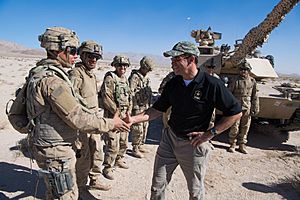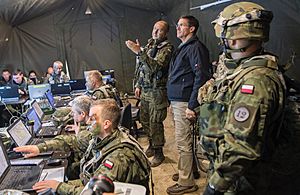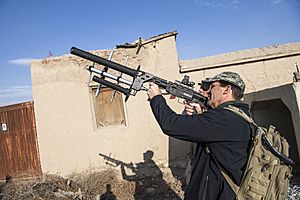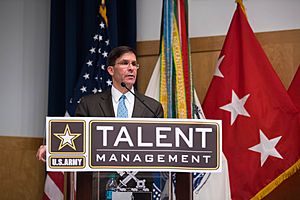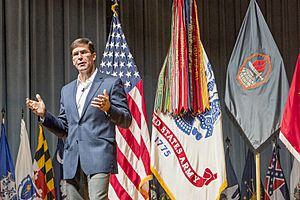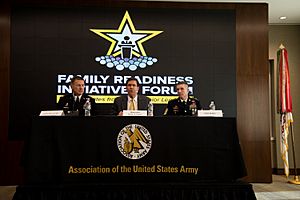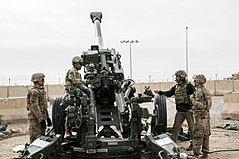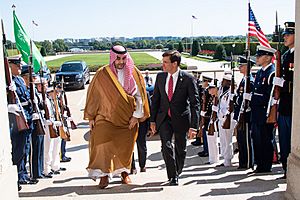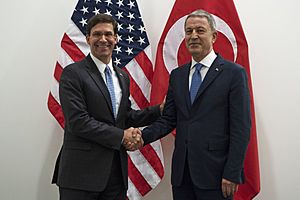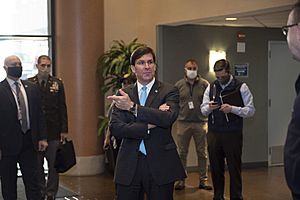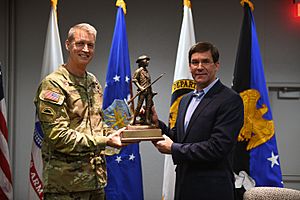Mark Esper facts for kids
Quick facts for kids
Mark Esper
|
|
|---|---|
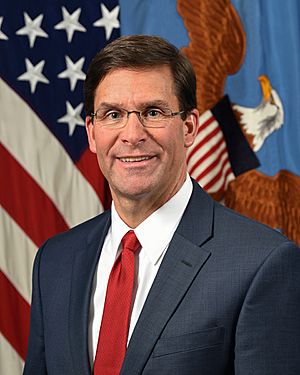
Official portrait, 2019
|
|
| 27th United States Secretary of Defense | |
| In office July 23, 2019 – November 9, 2020 |
|
| President | Donald Trump |
| Deputy | Richard V. Spencer (acting) David Norquist (acting) |
| Preceded by | Jim Mattis |
| Succeeded by | Lloyd Austin |
| Acting June 24, 2019 – July 15, 2019 |
|
| President | Donald Trump |
| Deputy | David Norquist (acting) |
| Preceded by | Patrick M. Shanahan (acting) |
| Succeeded by | Richard V. Spencer (acting) |
| 23rd United States Secretary of the Army | |
| In office November 20, 2017 – July 23, 2019* |
|
| President | Donald Trump |
| Deputy | Ryan McCarthy |
| Preceded by | Ryan McCarthy (acting) |
| Succeeded by | Ryan McCarthy |
| Personal details | |
| Born |
Mark Thomas Esper
April 26, 1964 Uniontown, Pennsylvania, U.S. |
| Political party | Republican |
| Spouse |
Leah Lacy
(m. 1989) |
| Children | 3 |
| Relatives | George Esper (uncle) |
| Education | United States Military Academy (BS) Harvard University (MPA) George Washington University (PhD) |
| Occupation | Business executive, venture capitalist, politician |
| Civilian awards | Department of Defense Medal for Distinguished Public Service (Two awards) |
| Signature | |
| Website | www.marktesper.com |
| Military service | |
| Branch/service | United States Army |
| Years of service | 1986–2007 |
| Rank | Lieutenant Colonel |
| Unit | 101st Airborne Division 82nd Airborne Division Virginia Army National Guard D.C. Army National Guard United States Army Reserve |
| Battles/wars | Gulf War |
| Military awards |
|
| *McCarthy served in an acting capacity from June 24, 2019 to July 15, 2019, while Esper served as Acting U.S. Secretary of Defense. | |
Mark Thomas Esper (born April 26, 1964) is an American politician and manufacturing executive who served as the 27th United States secretary of defense from 2019 to 2020. A member of the Republican Party, he had previously served as the 23rd U.S. secretary of the Army from November 2017 to July 2019.
A West Point graduate, Esper joined the United States Army and saw combat during the Gulf War as an infantry officer with the 101st Airborne Division. Esper subsequently served in the 82nd Airborne Division and the Army National Guard. After leaving military service, he served as chief of staff at the Heritage Foundation; a congressional staffer; a deputy assistant secretary of defense; and a senior executive for the Aerospace Industries Association, the Global Intellectual Property Center, and the U.S. Chamber of Commerce. Immediately before joining the Trump administration, Esper lobbied for defense contractor Raytheon as its vice president of government relations.
In 2017, he joined the Trump administration as the 23rd secretary of the Army. In 2019, Esper was named acting defense secretary; he was confirmed shortly afterwards as the 27th defense secretary by the United States Senate with a vote of 90–8. He was fired by President Donald Trump by tweet on November 9, 2020.
Contents
- Early life and education
- Career
- Secretary of the Army
- Secretary of Defense
- Temporary appointment and nomination
- Tenure
- Firing of the Secretary of the Navy
- Withdrawal of U.S. forces from Afghanistan
- Withdrawal of U.S. forces from Germany
- COVID-19 pandemic
- George Floyd protests and Insurrection Act
- Addressing diversity and inclusion in the U.S. military
- Basic Exchange and Cooperation Agreement for Geo-Spatial Cooperation
- Firing by Trump and subsequent events
- Other activities
- Awards
- Personal life
- See also
Early life and education
Esper was born on April 26, 1964, in Uniontown, Pennsylvania as the son of Pauline "Polly" Reagan and Thomas Joseph Esper. His father was a member of the Maronite Church. His paternal grandfather was an immigrant from Lebanon, and his uncle was war journalist George Esper.
Esper graduated from Laurel Highlands High School outside Uniontown, Pennsylvania, in 1982. He received his Bachelor of Science in engineering from the United States Military Academy in 1986. Esper was a dean's list student at West Point and received the Douglas MacArthur Award for Leadership. He received a master's degree in public administration from Harvard Kennedy School in 1995 and a doctorate in public policy from George Washington University in 2008.
Career
Esper served as an infantry officer with the 101st Airborne Division and deployed with the "Screaming Eagles" for the Gulf War. His battalion was part of the famous "Hail Mary" deep into southern Iraq that helped lead to the defeat of the Iraqi Army. He later commanded an airborne rifle company in Europe and served as an Army fellow at the Pentagon. Esper served on active duty for more than ten years before moving to the Army National Guard and later the Army Reserve, rising to the rank of lieutenant colonel. Esper is a two-time recipient of the Department of Defense Medal for Distinguished Public Service. Among his military awards and decorations are the Legion of Merit, Bronze Star Medal, Kuwait Liberation Medal, and the Combat Infantryman Badge.
Esper was chief of staff at the Heritage Foundation, a conservative think tank, from 1996 to 1998. From 1998 to 2002, Esper served as a senior professional staffer for the Senate Foreign Relations Committee and the Senate Governmental Affairs Committee. He was also a senior policy advisor and legislative director for U.S. Senator Chuck Hagel. He was policy director for the House Armed Services Committee from 2001 to 2002. From 2002 to 2004, Esper served in George W. Bush's administration as deputy assistant secretary of defense for negotiations policy, where he was responsible for a broad range of nonproliferation, arms control and international security issues. He was director for national security affairs for the U.S. Senate under Majority Leader Bill Frist from 2004 to 2006.
Esper was executive vice president at the Aerospace Industries Association in 2006 and 2007. From September 2007 to February 2008, Esper served as national policy director to U.S. Senator Fred Thompson in his 2008 presidential campaign. During that same period, Esper was a Senate-appointed commissioner on the U.S.-China Economic and Security Review Commission. From 2008 to 2010, Esper served as executive vice president of the Global Intellectual Property Center and vice president for Europe and Eurasia at the U.S. Chamber of Commerce. He was hired as vice president of government relations at defense contractor Raytheon in July 2010. Esper was recognized as a top corporate lobbyist by The Hill in 2015 and 2016. Esper's departure from Raytheon included a deferred compensation package after 2022.
Secretary of the Army
President Donald Trump announced his intention to nominate Esper as Secretary of the Army on June 19, 2017. He was Trump's third nominee for the position, following the withdrawals of Vincent Viola and Mark E. Green. He was confirmed to this post by an 89–6 vote of the U.S. Senate on November 15, 2017 and sworn in on November 20, 2017.
During his confirmation hearing before the Senate Armed Services Committee in November 2017, Esper said that he would have three priorities as Army secretary: readiness, modernization (including of the military acquisition process and personnel system), and efficiency. He identified taking care of Soldiers, their families, and Department of the Army civilians as an enduring priority.
The Army Vision
In mid-2018, Esper published a new Army Vision that outlined the goals he wanted to achieve by 2028, as well as the ways and means to get there. The Vision focused the service on China as the pacing threat in a future high-intensity conflict. The top line goals were growing the force to more than 500,00 active-duty soldiers, building a talent-based "perform or out" personnel system, re-engineering the Army acquisition system by establishing a "Futures Command" to modernize the force, and scouring the service's budget to pay for these improvements.
Recruiting reform
After missing its recruiting goal in 2017, Esper and his leadership team pursued an overhaul of the service's recruiting enterprise, with a stated focus on growing the force and emphasizing quality over quantity. ..... At the same time, the Army hired a new marketing firm to refresh its overall approach with a business-like focus on specific objectives. This was complemented by an Army push into online outreach and a variety of social media, such as an Army eSports and CrossFit team, all of which helped Army recruiting during the COVID pandemic. Esper also brought back the World War II–era "pinks and greens" uniform—the iconic Army attire of the greatest generation—as a rebranding initiative and morale booster for recruiters. In late 2018, the Army developed a "22 City" initiative that put a recruiting focus on major U.S. cities that were traditionally underserved, had little interaction with the U.S. military, and produced a lower-than-expected number of recruits annually. The aim was to expand these markets by dramatically increasing the number of Army recruiters, advertising, and visits by senior Army leaders. All of these initiatives began seeing positive results by mid-2019.
Army readiness
In early 2017, the Army's readiness was at a low point when it came to fighting a near-peer threat like China or Russia. Only a few out of the Army's thirty-one active-duty brigade combat teams (BCTs) were fully ready to deploy. To address these issues, Esper pursued several initiatives to improve individual and unit readiness. In the spring of 2018, several dozen mandatory training, inspection, and reporting requirements were eliminated. The aim was to reduce those tasks directed from higher echelons that prevented junior officers and NCOs from training their soldiers as they saw best. With regard to unit training, Army forces were directed to focus on high-intensity combat operations against near-peer adversaries (e.g., China and Russia). To both drive and measure success, exercises at the Army's premier National Training Center (NTC) were geared exclusively to these types of operations (which included new forms of warfare such as drone operations) and unit rotations to the NTC were maximized for the first time in years. Other initiatives to improve Army readiness included a new health and physical fitness regime, increases in training dollars, updated policies regarding individual deployability, and personnel changes that kept units together longer. By the summer of 2019, it was reported that the number of non-deployable soldiers was reduced by 65%, with a 250% increase in the number of Army BCTs considered combat ready.
Overhaul of initial entry training
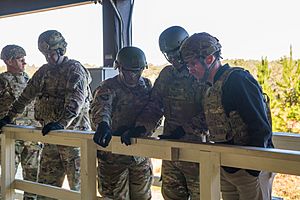
Esper launched a reform initiative in 2018 to improve initial entry training for combat soldiers. His directive extended basic and advanced infantry training by over 50 percent, to twenty-two weeks, making it one of the longest initial training programs in the world and the first major overhaul of the Army's initial training since the 1970s. The additional training time allowed the Army to broaden, lengthen, and deepen weapons training, vehicle-platform familiarization, combatives instruction, field training, land navigation, and night operations, while adding a 40-hour combat-lifesaver certification course and water survival training, among other things.
Initial reports in early 2019 showed a 50 percent reduction in attrition and injuries, with significant improvements across the board, including in physical fitness, land navigation, and marksmanship skills. The additional training time and a significant reduction in the drill-sergeant-to-trainee ratio were major drivers of these results. Given the program's success, Esper and his leadership team decided to expand basic and advanced training for other branches, such as armor and cavalry.
Restructuring the Army
To prepare the Army for high-intensity conflict that was expected against China or Russia, Esper undertook several major initiatives designed to enhance the service's combat readiness. In 2018, the Army began rebalancing its force structure by converting two Infantry Brigade Combat Teams to the tank-centric Armored Brigade Combat Teams, increasing the service's heavy and more lethal maneuver forces by over 25%.
The Army also launched new programs to rebuild longer-range precision artillery/rocket systems and mobile air-defense battalions – two specific combat functions that were neglected during the low-intensity wars in Iraq and Afghanistan. These were two of the six modernization priorities outlined by Esper and his leadership team.
A new Multi Domain Task Force (MDTF) was established in 2018 to better integrate and network a variety of combat functions, including air defense, long range fires, cyber, space, and electronic warfare. The first MDTF, designed to counter an increasingly capable China, was deployed to the Indo-Pacific, with additional task forces planned for there and Europe. The MDTFs complemented other ideas being studied by Army leadership to enhance its warfighting capabilities, such as adding additional mechanized infantry companies to its armored formations, along with electronic warfare and cyber capabilities to its brigades.
In February 2020, the Army announced the reactivation of the V Corps (and its basing at Fort Knox, Kentucky), with a forward headquarters to be established months later in Poland. According to Esper, the purpose behind establishing a fourth corps was to improve command and control in Europe, and help organize the war planning and preparations of the United States' Army and its NATO allies as they squared off against a revanchist Russia on the continent. The activation of V Corps preceded the largest planned deployment of U.S. forces to Europe since the Cold War in the spring of 2020. The movement of tens of thousands of U.S. troops and their equipment to exercise locations across Europe was designed to test the Army's deployability and readiness, while also reassuring NATO allies of the service's ability to respond quickly in a crisis.
Night court
Night Court was the name ascribed to the unconventional process launched by Esper in early 2018 to free up funding for the Army's modernization priorities. The process began when Esper, reportedly frustrated that the Army Staff was unable to identify the budget needed to fund his modernization initiatives, directed the staff to rank every single one of the service's five-hundred-plus acquisition programs in order of importance (as they saw them), and then justify why each one should receive funding before the Army's new thirty-five programs.
Moreover, the staff was told to find savings from all the service's accounts, not just the acquisition portfolio. Esper, Chief of Staff Mark Milley, and other Army leaders then personally reviewed every existing program over a period of several weeks. The effort resulted in the leadership team finding over $31 billion in savings. They eliminated or reduced 186 programs to fund the service's modernization strategy, as well as other initiatives such as expanded basic training, a new recruiting campaign, and an overhaul of the Army's physical fitness program. Every one of the Army's top thirty-plus programs bundled under the Army's new six modernization priorities received the money it needed in the FY2019 budget as a result.
The Army continued its Night Court proceedings through the fall of 2018 and into 2019. By the spring of that year, only a few months before Esper became Secretary of Defense, the service canceled another forty-one programs, and delayed or reduced thirty-nine more, to find an additional $13.5 billion in savings for its modernization efforts in the FY2020 budget. Esper eventually applied the Night Court process to the entire Department of Defense when he became the Defense Secretary in July 2019.
Army modernization and Army Futures Command

In 2018, Esper directed the establishment of Army Futures Command (AFC) in Austin, Texas. It was the biggest change in the Army's structure in over four decades. AFC's purpose was to "establish unity of command and unity of effort by consolidating the Army's entire modernization process under one roof." One commander would be driving concept development, requirements determination, organizational design, science and technology research, and solution development. Eight cross-functional teams, each led by a brigadier general, were also established to rapidly and efficiently coordinate all the acquisition players in order to ensure cost, time, and schedule milestones were met. The goal was to avoid the acquisition failures of the past in order to field the weapons needed in the future.
To guide AFC's work, the Army leadership established six modernization priorities, which included long-range precision fires, next-generation combat vehicles, future vertical lift, Army network, air and missile defense, and soldier lethality. Included under these broad categories were thirty-one top tier programs that would deliver the future force. An additional four programs were added by the service's Rapid Capabilities and Critical Technologies Office, which Esper established in late 2018 to "find and harvest emerging critical technologies" in the private sector for the AFC's use.
In February 2022, the Army announced that 24 of the service's 35 modernization programs will be in soldiers' hands as fielded systems or prototypes in fiscal year 2023.
Soldier health and fitness
In 2018, Esper directed a multi-year phased adoption of the new Army Combat Fitness Test (ACFT). The six-event ACFT replaced the three-event Army Physical Fitness Test that had been in use since 1980. The ACFT was based on the Army's wartime experiences in Iraq and Afghanistan, more than a hundred critical "warrior tasks and drills," and modern fitness regimens. It was also based on extensive data on how, where, and why soldiers suffered physical injuries that made them non-available for combat duty. Further, the ACFT mimicked the skills, movements, and other physical tasks associated with wartime tasks.
A year later, Esper approved plans to assign sports trainers, physical therapists, nutritionists, and other specialists to the Army's brigades and battalions as a second pillar of improving the service's fitness culture. The "Holistic Health and Fitness" (H2F) program as it became known aimed to "optimize soldier readiness, reduce injury rates, improve rehabilitation after injury, and increase the overall effectiveness of the Army." The adoption of the new ACFT and its training regimen, the initial establishment of the H2F program, and other initiatives resulted in a reduction in soldier non-deployability rates from over 15% in 2017 down to under 6% by the end of 2019, leading to an increase in units' readiness across the Army.
Talent management
In 2019, Esper shifted focus to another pillar of the "Army renaissance" that needed reform – the Army personnel system. A core objective was to move away from a command-driven people management model branded as "up or out" to a new market-based talent management approach that offered more room for personal preferences and emphasized "perform or out." A Talent Management Task Force led by General Jim McConville, the Vice Chief of Staff of the Army, and Esper, went about setting up the market-based model for commanders and soldiers (beginning with the officer corps)—the buyers and sellers, respectively—that would give them more say in their careers, their timelines, and the assignments they took.
Within the constraints of a military system where the needs of the Army still came first, the task force worked to give service members more say in their careers, while also improving efficiency and attaining higher rates of satisfaction. Examples of the new system that emerged included the Army Talent Alignment Process, which allowed soldiers to remain at one duty station longer than three years if they wanted, and permit them to search and apply for jobs across the Army. Commanders, conversely, would be able to search for and interview applicants, thus affording them the opportunity to make better choices about who served in their units. They could attract top talent by advertising things such as their command philosophy, training regimen, and the expectations they had of their subordinates, for example.
In the summer of 2019, the Army also piloted a new multiday approach to choosing battalion commanders – arguably the most important command selection in an officer's career – based on the NFL's Combine. Under this new system, selected officers underwent "a series of cognitive, non-cognitive, and physical assessments," such as fitness tests, assessments of verbal and written communications skills, and a double-blind interview with a panel of senior officers, over a period of several days. The results of this weeklong period were eventually provided to promotion boards. Other initiatives being developed included giving service members the opportunity to take yearlong unpaid sabbaticals without being penalized, and making it possible for soldiers to make seamless transitions between the regular Army, the National Guard, and the Army Reserve as their professional goals or personal situations changed over time.
Family care
Esper identified "taking care of Soldiers and their families" as a top priority during his nomination hearing. At the top of this list was spousal hiring and childcare, two priorities borne out of his wife's experiences when he served on active duty. Esper pushed on several fronts to advance this initiative: making professional license reciprocity a condition for where the Army would initiate or expand base investment decisions; working with state and federal lawmakers to mandate license reciprocity and incentivize the hiring of military spouses; reducing the number of PCS moves military families would make in order to give spouses job stability and their children school stability; reducing the on-base hiring timeline and requirements for civilian applicants; and expanding capacity at childcare centers while prioritizing the children of uniformed personnel over civilians. As Secretary of Defense, Esper went further by pushing to standardize and tailor childcare center operating hours for service members who worked weekend and unusual hours.
Another family issue that Esper worked to improve was the Exceptional Family Member Program, a program for assisting and prioritizing service members with a child in need of specialty care or medical attention. His focus was on improving access, especially for overseas or remote assignments, and then standardizing that process across the Department of Defense. Another area of emphasis was ensuring quality on-base housing for service members. Esper conducted multiple inspections of military homes across the service to determine the cause and extent of the problem, pressed housing contractors to meet their obligations to maintain quality homes and complete work orders more quickly and properly, wrote the department's housing "bill of rights" for service members, and collaborated with lawmakers on legislative changes to improve quality of life for those in uniform.
Transgender servicemembers
President Trump tweeted his objections to transgender servicemembers in July 2017, and, under his Presidential Memorandum of August 25, 2017, he required the Department of Defense to produce a report on this subject. Esper was asked by reporters in February 2018 whether soldiers had concerns about serving beside openly transgender individuals. He replied: "It really hasn't come up."
After Esper was nominated to become Secretary of Defense, he said that he had met several transgender service members and was impressed with them. Nonetheless, he supported Directive-type Memorandum-19-004, which required service members to meet cisgendered standards associated with their biological sex. Esper claimed it was not a "blanket ban" on transgender service members but rather a policy to ensure that service members are deployable worldwide and can meet military standards without "special accommodations." He said that service members would be individually assessed and that some would be offered waivers to continue serving. In this interview, Esper cited the Defense Department's February 2018 report to support his views.
Secretary of Defense
Temporary appointment and nomination

Trump announced the appointment of Esper as Acting Secretary of Defense on June 18, 2019, after Acting Secretary Patrick Shanahan decided to withdraw his nomination. Four days later, it was announced that Trump would nominate Esper to serve as Secretary of Defense in a permanent capacity. On July 15, 2019, the White House formally sent his nomination to the Senate. Following his formal nomination, Esper was replaced as Acting Defense Secretary by Secretary of the Navy Richard Spencer, as the Federal Vacancies Reform Act of 1998 prevented Esper from serving as acting secretary while his nomination was formally under consideration. During that period, Esper reverted to his position as Secretary of the Army. The Senate Committee on Armed Services scheduled a hearing on the nomination for the next day. On July 22, 2019, the Senate voted 85–6 to invoke cloture on his nomination. On July 23, 2019, his nomination was confirmed by a vote of 90–8.
Tenure
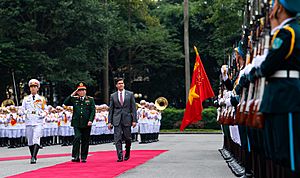
Esper said that his operating positions as Secretary of Defense would be apolitical, in keeping with the National Defense Strategy formulated in 2018 by his predecessor Jim Mattis.
Esper met with his European counterparts in February 2020 to discuss basing options for a new United States Army headquarters in Europe, bearing the name "V Corps" that had originally been established in World War I but was inactivated while stationed in Germany in 2013. Esper stated the new headquarters was needed to improve military coordination among NATO partners.
In response to the National Defense Authorization Act for Fiscal Year 2020, which included $738 billion in defense spending, Esper said: "I'm good with those dollars. No complaints." Esper provided a framework for members of Congress to insert a proviso in the annual National Defense Authorization Act (NDAA) which guides the naming of military installations.
On November 24, 2019, during a dispute regarding whether Navy SEAL Eddie Gallagher would be stripped of his Trident pin, Esper fired the United States Secretary of the Navy, Richard Spencer. The Department of Defense attributed the firing to Spencer privately proposing to the White House (without informing Esper and contrary to Spencer's public position) an arrangement to let Gallagher retire while keeping his Trident pin. On November 25, Esper stated that Trump had ordered him to stop the Navy from conducting a peer review regarding Gallagher's right to wear the pin. Esper said he previously supported the peer review, but followed Trump's order. Meanwhile, Trump cited the Gallagher case as the primary reason for Esper's firing of Spencer, while also citing "large cost overruns" in the Navy.
Withdrawal of U.S. forces from Afghanistan
On February 29, 2020, the Trump administration signed a conditional peace agreement with the Taliban, which called for the withdrawal of American troops from Afghanistan within 14 months, if the Taliban upheld the terms of the agreement. In May 2020, Esper said: "I don't put a timeline on it. We have a timeline of May of next year but that timeline was premised on everything moving at a set pace."
Withdrawal of U.S. forces from Germany
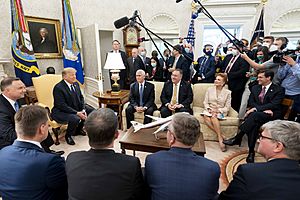
In 2020, Trump directed the Pentagon to remove 11,800 of the nearly 35,000 American troops stationed in Germany. Trump said the move was partially influenced by U.S. frustration with Nord Stream 2 gas pipeline from Russia to Germany, owned by Russia's Gazprom; cited Germany's unwillingness to spend more on defense in support of NATO and accused Germany of being "very delinquent"; and said of Germany, "They make a fortune off the troops. They build cities around our troops. ... We'll let ourselves get rich first." While Trump framed the withdrawal as an act of retribution against the Germans, Esper cited a different rationale, framing the decision in strategic terms, although he acknowledged that Trump's anger at German military spending "accelerated" the process. Esper agreed with Trump that Germany was a "rich country" that "can and should pay more for its defense."
The idea for a significant reduction of troops from Germany originated from the White House, where it was pushed by two Trump advisers, Robert C. O'Brien and Richard Grenell. Defense Department officials were largely cut off from the decision making, and they feared that the partial withdrawal from Germany would inhibit regional defenses against Russia. Esper had significant concerns about the plan, but avoided publicly criticizing it and worked to implement Trump's directive. Esper reportedly believed that Trump's demand for speedy troop withdrawal was logistically impossible; the Associated Press reported that "A number of NATO diplomats and officials have suggested the pullout—which would be costly and might not even be logistically possible before the U.S. elections in November—probably won't happen."
Trump's announcement of the withdrawal of U.S. troops was made without consultation with Germany or other NATO allies. In June 2020, Esper traveled to NATO headquarters in Brussels to meet with NATO secretary general Jens Stoltenberg and to reassure him that the U.S. would not announce any further troop movements or reductions without first consulting with NATO allies.
In June 2020, Trump said at a press conference with Polish President Andrzej Duda that the United States planned to move some U.S. troops from Germany to Poland. Esper backed Trump's decision, saying that the Pentagon wants to send more troops to the Baltic states, Poland and Romania.
COVID-19 pandemic
In late January 2020, as the coronavirus spread, Esper said he was "not tracking" its spread, as the Trump administration downplayed the risks of the disease.
As the coronavirus outbreak turned into a pandemic in early March 2020, Esper directed overseas commanders of U.S. forces to check with him before taking actions to protect U.S. troops, lest they contradict the Trump administration's messaging on the coronavirus. Esper said that "My No. 1 priority remains to protect our forces and their families." The following week, Esper directed the deployment of two Navy hospital ships, the USNS Comfort and the USNS Mercy, to take pressure off New York and Los Angeles hospitals as they coped with the pandemic. Esper also authorized the Defense Department to provide civilian health authorities with five million respirator masks and 2,000 specialized ventilators.
In early April 2020, Acting Secretary of the Navy Thomas Modly removed Navy Captain Brett Crozier from command of the aircraft carrier USS Theodore Roosevelt after Crozier pleaded with Navy leaders to move more quickly to in the face of a coronavirus outbreak on the ship. Esper defended Modly's decision, though he conceded that he had not read Crozier's letter calling for help. Within days, widespread condemnation led Modly to resign. Esper named James McPherson, Under Secretary of the Army, to replace him.
On April 14, 2020, Esper announced the extension of a travel freeze on military members and Department of Defense civilian employees. The original order to stop movement was to last for 60 days, but Esper said that additional time was needed to stop the spread of the virus. Several days following the announcement, Esper extended the freeze through June 30, 2020.
Lawmakers, retired officers and experts criticized Esper's response to the coronavirus, describing it as slow and indecisive. According to Politico, there was discontent within the Department of Defense about Esper's leadership on the issue. Esper primarily left it up to local commanders in terms of how they would respond to the pandemic, which resulted in uneven responses. Several military officials said there was a lack of top-down planning and guidance on important decisions. In a letter in late April 2020, ten Democratic senators called Esper's leadership "disjointed and slow", saying that DOD's civilian leadership had "failed to act sufficiently, quickly, and has often prioritized [combat] readiness at the expense of the health of service members and their families." A Pentagon spokesman defended DoD's handling of the pandemic.
In May 2020, at an event marking the 75th anniversary of the Allied victory in Europe, Esper was criticized for interacting with seven World War II veterans who were between the ages of 96 and 100 without wearing a facemask. In response to critics, the administration said that Esper and the veterans were tested before the event.
George Floyd protests and Insurrection Act
Public outrage over the May 25, 2020, murder of George Floyd, unarmed Black man, by a police officer gave way to destructive protests in Minneapolis–Saint Paul. The night of May 28, a police station in Minneapolis was overrun by demonstrators and set on fire—a shocking image of the prevailing civil disorder. The next morning, Esper, along with General Mark Milley and Attorney General Bill Barr, privately discouraged Trump from invoking the Insurrection Act to deploy military troops to Minneapolis.
On June 1, 2020, amid widening nationwide civil unrest, Trump at one point demanded the deployment of 10,000 active-duty troops to the streets of Washington and other U.S. cities in a heated meeting in the Oval Office with Esper and Chairman of the Joint Chiefs of Staff Mark Milley, who opposed this request. Trump's spokesperson Alyssa Farah and Attorney General William Barr denied that Trump had requested the deployment of 10,000 active-duty troops, with Barr saying instead that Trump wanted troops on "standby."
Esper participated in a June 1 call with state governors, Trump, and Barr, in which Trump urged governors to "dominate" and use aggressive methods. During the call, Esper said, "I think the sooner that you mass and dominate the battlespace, the quicker this dissipates and we can get back to the right normal." Esper's suggestion that American cities were a "battlespace" prompted significant criticism, including from former Joint Chiefs of Staff chairman Martin E. Dempsey and former Special Operations Command head Raymond A. Thomas. At a subsequent press conference, Esper said that he did not intend the use of the term to focus "on people, and certainly not on our fellow Americans."
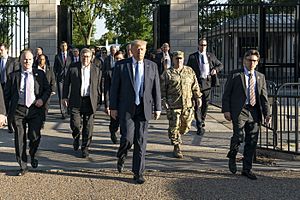
On June 1, Esper walked alongside Trump to a photo op in front of St. John's Episcopal Church outside the White House; just prior, police in riot gear and mounted police cleared protestors who started throwing bricks and other projectiles after police began using smoke and flash grenades and a chemical irritant spray from Lafayette Square, clearing a path for Trump, Esper and several other Trump administration officials. Esper's participation in the photo op was criticized by a number of retired senior military officers.
Two days later, at a Pentagon press conference, Esper said, regarding the Lafayette Park photo op, that, "Well, I did know that we were going to the church. I was not aware of a photo op was happening," adding, "And look, I do everything I can to try to stay apolitical and try and stay out of situations that may appear political. And sometimes I'm successful at doing that, and sometimes I'm not as successful, but my aim is to keep the department out of politics to stay apolitical."
Esper broke with Trump by publicly opposing invocation of the Insurrection Act of 1807 and the deployment of active-duty troops in American cities, saying that "the National Guard is best suited for performing domestic support to civil authorities ... I say this not only as Secretary of Defense, but also as a former soldier, and a former member of the National Guard. The option to use active duty forces in a law enforcement role should only be used as a matter of last resort, and only in the most urgent and dire of situations. We are not in one of those situations now. I do not support invoking the Insurrection Act." Esper took steps in the following days to further de-escalate the situation, removing weapons and ammunition from the National Guard, and returning troops to their home bases without notifying the White House. Trump reportedly considered firing Esper over the situation.
On June 6, the House Armed Services Committee (HASC) invited Esper and Milley to testify before the committee regarding the events of June 1; they declined. Chief spokesman Jonathan Hoffman said in statement that the pair "have not 'refused' to testify'" and that the department's "legislative affairs team remains in discussion" with the committee. HASC chairman Representative Adam Smith later acknowledged in a written letter that Esper and Milley may have been prevented from appearing by the White House. Esper and Milley subsequently agreed to appear before the House Armed Services Committee on July 9. In the meantime, on June 8, Army Secretary Ryan McCarthy briefed the committee on the presence of the National Guard in Washington, D.C., on June 1, which was during the protests.
Days later, Esper and Milley responded in detail to a series of questions asked of them by HASC chairman Smith regarding events during the week of June 1. Smith later said the Pentagon had been "reasonably cooperative" in providing witnesses to the committee amid logistical issues during the coronavirus pandemic.
Addressing diversity and inclusion in the U.S. military
Amid the nationwide racial unrest beginning in late May 2020, Esper directed Pentagon civilian and uniformed leaders to come up with ideas that could be used to quickly improve equal opportunity, diversity, and inclusion in the Armed Forces; established an internal Defense Board on Diversity and Inclusion in the Military to recommend ways to increase racial diversity and ensure equal opportunity across all ranks, especially in the officer corps, by December 2020; and created a Defense Advisory Committee on Diversity and Inclusion in the Armed Services, mirroring the Defense Advisory Committee on Women in the Services.
On June 18, 2020, Esper said that while the Defense Department has often led on issues of race and discrimination, he cited underrepresentation of minorities in the officer ranks as a particular problem.
Basic Exchange and Cooperation Agreement for Geo-Spatial Cooperation
In October 2020, Esper and U.S. Secretary of State Mike Pompeo met with Indian Minister of External Affairs Subrahmanyam Jaishankar and Minister of Defense Rajnath Singh to sign the Basic Exchange and Cooperation Agreement on Geospatial Cooperation (BECA), which facilitates the sharing of sensitive information and intelligence—including access to highly-accurate nautical, aeronautical, topographical, and geospatial data—between the United States and India. The agreement had been under discussion for over a decade, but previous concerns over information security impelled India's United Progressive Alliance (UPA) coalition government to block it.
Firing by Trump and subsequent events
After Trump lost the 2020 presidential election to Joe Biden, Trump launched a months-long effort to subvert the election outcome and remain in power, falsely claiming that the election had been "stolen" from him. In his subsequent memoir, published in 2022, Esper wrote that Trump's effort "was a national embarrassment that undermined our democracy, our credibility, and our leadership on the world stage."
On November 9, 2020, days after his election loss, Trump tweeted that Esper was "terminated," and that he had been replaced by Christopher C. Miller, the director of the National Counterterrorism Center who would serve as Acting Secretary of Defense. Esper had written his resignation letter four days earlier, when a winner had not yet been determined.
On January 2, 2021, days before the end of Trump's term and the inauguration of Biden, Esper, along with all other living former secretaries of defense, published a Washington Post op-ed piece in January 2021 that rebuked Trump's effort to alter the election results, and said there was no role for the military to change them. The group's piece appeared days after Trump ally Michael Flynn, an ex-Army general, and reportedly Trump himself, discussed the possibility of declaring martial law and attempting to stay in power. The group wrote: "Our elections have occurred. Recounts and audits have been conducted. Appropriate challenges have been addressed by the courts. Governors have certified the results. And the electoral college has voted. The time for questioning the results has passed; the time for the formal counting of the electoral college votes, as prescribed in the Constitution and statute, has arrived." Esper later wrote that Trump's behavior on January 6, when a mob of his supporters, incited by the president, attacked the Capitol and disrupted the counting of the electoral votes, "threatens our democracy."
Other activities
Esper is currently the Distinguished Chair of the Modern War Institute (MWI) at the U.S. Military Academy at West Point.
In 2021, Esper was named the first John S. McCain Distinguished Fellow at the McCain Institute for International Leadership, a Washington, D.C.-based think tank; he is also a member of the institute's board of trustees.
Also in 2021, Esper joined the board of directors for the Atlantic Council, and was named co-chair (along with Deborah Lee James) of a commission tasked with making recommendations to the Pentagon reform on improving the Defense Department's ability "to rapidly absorb commercial technologies" from the private sector in order to enhance the U.S. military's warfighting capabilities.
Esper joined the International Advisory Council of GLOBSEC, a European-based global think tank, in 2023.
In April 2022, the Washington-based venture capital firm Red Cell Partners announced that Esper had joined the firm as a Partner and chairman of its national security practice; he is also a member of Red Cell's board of directors.
Esper is a frequent guest on news shows such as CNN, CNBC, Fox News, and Bloomberg, and participates in the professional speaking circuit through the Harry Walker Agency and the Worldwide Speakers Group.
He is also a member of the Aspen Strategy Group, the U.S. Global Leadership Coalition, the Council on Foreign Relations.
Awards
In 2018, The George Washington University presented Esper with its Distinguished Alumni Award for his service as Secretary of the Army.
Esper received the George C. Marshall Foundation's Andrew J. Goodpaster Award (2021) and the Reagan Presidential Foundation & Institute's "Peace Through Strength" Award (2022).
The President of Lithuania awarded Esper the Cross of Commander of the Order for Merits to Lithuania on March 22, 2023, in the capital, Vilnius.
On May 20, 2023, Esper received the Military Hero Award by the PenFed Foundation at its annual gala in Washington, D.C.
Taiwan Minister of National Defense Chiu Kuo-cheng presented Esper with the "Order of Resplendent Banner with Grand Cordon" on behalf of the Republic of China on August 23, 2023, in Taipei, for his support of Taiwan's security.
Personal life
Esper married his wife, Leah Lacy, in 1989. The couple has three children. $
See also
 In Spanish: Mark Esper para niños
In Spanish: Mark Esper para niños


